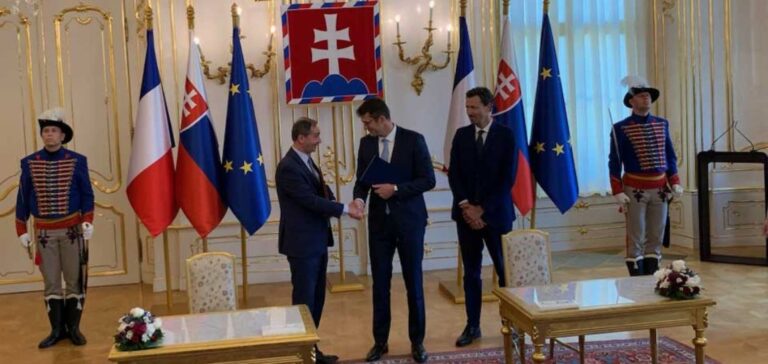Framatome signs a long-term fuel supply contract with Slovak utility Slovenské elektrárne.
This agreement, initiated in May 2023, provides for the delivery of nuclear fuel for the VVER reactors at the Bohunice and Mochovce power plants from 2027.
A strategic partnership for energy diversification
This contract marks a significant step forward in the long-standing cooperation between Framatome and Slovenské elektrárne.
Lionel Gaiffe, Senior Executive Vice President of the Fuel Business Unit at Framatome, underlines the importance of contributing to the diversification of Slovakia’s fuel supply and the reliable operation of the Bohunice and Mochovce nuclear power plants.
The international context underlines the urgency of a European energy solution to avoid any interruption of essential services and reduce dependence on imports from outside the European Union.
The recommendations of the Euratom Supply Agency (ESA) take particular account of the need for this diversification to ensure energy security.
Strengthening Slovakia’s energy security
Branislav Strýček, Chairman of the Board and CEO of Slovenské elektrárne, says the contract with Framatome strengthens Slovakia’s energy security.
Nuclear power plants play a crucial role in the country’s energy mix, making diversification of fuel supplies essential for their stable operation.
Framatome is responding to this requirement with a two-phase transition to secure the operation of European VVER reactors. In the short term, the company will produce fuel in line with current VVER reactor designs.
At the same time, Framatome is developing sovereign fuel for European 440 and 1000 MW reactors.
Impact on Europe’s nuclear fleet
Nineteen VVER reactors are currently in operation in Europe, in Bulgaria, the Czech Republic, Finland, Hungary and Slovakia.
These reactors, essential to the energy production of these countries, now benefit from a diversified and secure source of supply, in line with the European Union’s energy security objectives.
Framatome’s fuel supply for the VVER reactors is part of a broader strategy to secure nuclear energy in Europe.
Framatome stands out for its innovative, digital solutions and advanced technologies, which extend to the global nuclear sector.
With around 18,000 employees, the company continues to deliver a low-carbon, safe and cost-effective energy mix to its customers.
The agreement between Framatome and Slovenské elektrárne is a strategic step towards diversifying and securing the supply of nuclear fuel in Slovakia and Europe, responding to the growing need for energy security in an uncertain international context.






















